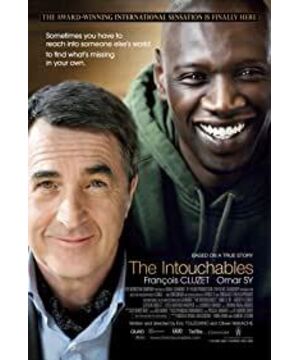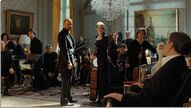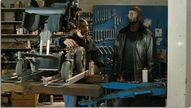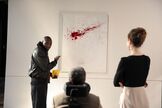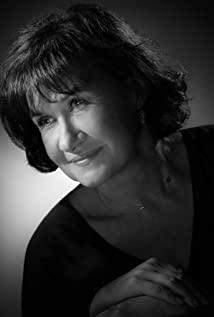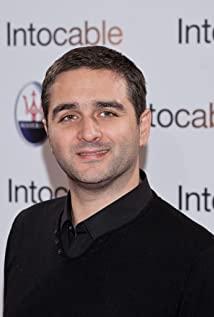2020 is my seventh year living in Paris. It's also because of the home life in a special period, I recently revisited the "Unreachable", only to find that I can talk about the two protagonists in the play, Philippe and Driss, and have some life experience. Let's talk about what Paris is like.
Let's start with Philippe's family. People who don't live in Paris can never imagine how small a house in Paris can be and how high the rent can be. A single small apartment of 8 square meters in a good area can be rented for 800 euros per month. There are many ring buildings like Philippe's house in Paris, but at least half of them have been sold or rented out (because there are not so many rich people who can afford the daily and tax expenses of the entire building). The buildings after being divided and transformed are like this: After entering the gate of the courtyard, the ring-shaped building is divided into 4-5 buildings, and the rooms inside will be divided into one household and one household, and each household will be transformed into a separate apartment with a kitchen and bathroom. . If you can afford one of them, 3 bedrooms and 1 living room, you can be considered a very wealthy family. And Philippe's home is the whole of the ring building inside the gate of the courtyard, not far from the Seine River and Les deux magots cafe (one of the famous century-old cafes in Paris, Shuangsou Cafe), so Philippe's home is not only located in The center of Paris is as simple as it is, and it is still a left-bank area of the very capital in the center of Paris. I guess it is the "Saint-Germain District". Today, even if you buy the most ordinary house there, it will not be less than 2w per square meter. Philippe's house maintains a room-to-room French palace-style apartment (you will know this type of apartment if you have visited the Palace of Versailles) and decoration, not to mention that Philippe still employs so many people and owns a private jet. Philippe is such a rich man. He has a life of his class. In the life circle of ordinary people, there is no such a Philippe.
Let's see what kind of person Philippe is? He is not only a rich man, but also a nobleman, which is different. Nobles pay the most attention to connotation and self-cultivation. Philip likes reading, art, and classical music. He communicates with pen pals very carefully (the other party who can maintain communication with such a Philippe must also be a woman with rich connotation). There are many people in France who pretend to be in this regard, but Philip is not, because although he is arrogant in spirit, he is not arrogant in wealth, and he does not discriminate against skin color, background, knowledge... If there were, such a story would never have happened.
Besides, Driss's family, his home is not in Paris, he needs to take the RER underground express to enter and leave Paris, and looking at the buildings he lives in, the rows of dense, high-floor "stacks of matchbox" buildings are mostly built in In a suburban city outside Paris, such a building is the HLM (government low-rent housing) in France. This is the case in France. The more people can live together in a building, even if it is newly built and has modern facilities such as elevators, the more the poor live. If it is a construction project targeting the middle and upper class, even if it is a new building built in a suburban city (there are many suburban cities in the wealthy area to the southwest of Paris, such as Santa Cruz, Boulogne-Billancourt… ), a small building will also be built, the floor will not be very high, there will not be many residents in a building, and the construction of the surrounding green environment will be very important. Seeing the environment and people around Driss's house, I guess it is the suburban city of "Saint-Denis" in the north of Paris. How dangerous and complicated is the situation in this city - first of all, because France once colonized it in Africa Many countries in the world have passed the immigration greenway. Many poor Africans choose to live in France one after another. Most of them are arranged by the government in Saint-Denis, the city with the most HLM construction; secondly, there are many people from America, Asia, Including the local poor in France, they all choose to live here for low accommodation costs; at the same time, most of the Middle East war refugees accepted by France live here. Coupled with France's high welfare policy and open attitude, in addition to normal reception, there are also a lot of smuggling immigrants (first mixed into France, and then use loopholes to obtain French identity), so many disturbed elements are mixed in various channels. Most of the inbound teams came to France, and most of them chose to live in the city of Saint-Denis, which has formed various gray marginal systems and even black systems due to a vicious circle. Driss was brought to France by his uncle and aunt here. He already has a poor family with French status (the status comes first before welfare). Such a family has been supported by French taxation from the very beginning, and in France, a family has children. The more, the more welfare, so many poor families take advantage of this, relying on the number of children to ensure basic living expenses, the poorer the more students. When the child is an adult, if he has not participated in work, the government will start to help find job opportunities. If the job search (interview) has been rejected for a period of time, you can apply for a program called "unemployment benefits" more than three times. government benefits. Therefore, there are many such people in France who have been used by their families as "parasites" since childhood, and when they grow up, they just want to continue to eat government benefits and continue to be "parasites".
And what kind of person is Driss? Perhaps he was brought to France by his uncle and aunt as a bargaining chip for welfare. A child is the key to settling in France as a refugee family. As an adult, Driss still continues to be a "parasite", so there is a scene where he goes to Philippe's house to find a job. Driss didn't come to look for a job, he thought he would definitely not be employed, so he only wanted to get the employer's signature on the interview certificate (the government's benefits are strictly scrutinized, and the employer will be called to confirm, no fake signature) . Although Driss's words are direct and somewhat rude, he is a person who can distinguish between right and wrong in society. Although he has stole from a jewelry store, he does not allow his younger brother to sell drugs, and does not want other younger siblings to go astray, even when he sees his mother ( Aunt) hides cigarettes and lighters immediately when he gets home - Driss knows that smoking is bad, and of course he understands that stealing and jail time are also bad, so he wants to use "vacation" as an excuse to go to jail for 6 months. Mom (aunt) is guilty. But his life is so unbearable, his younger brothers and sisters are stubborn and neglectful in discipline; his mother (aunt), as the only parent in the family, does long hours of dirty work for the family's food and clothing, and has no time to educate the group of children at home. They can only go to the most common "happy education" type public schools in the society. This kind of school education process is extremely slow, and most of the time, they don't teach anything, and they mainly play. (Only aristocratic schools and expensive private schools are equipped with elite education.)
But the reality is often that people who have lived in desperation are stronger and more optimistic than those who grew up pampered.
One of the things that made me feel incredible in France was that there were always middle-aged and elderly French people who were not mentally sane on the road, abusing social injustice. At that time, an African classmate said to me: "These French people have had a very good life since childhood, and a little difficulty in life will make them nervous." Yes, I once sorted out the documents of a French intern when I was working. I happened to see that the intern's father's salary in 1982 was 8,000 francs per month. Converted to RMB, it was more than 9,200 yuan. Let me describe it intuitively. Coca-Cola In the 1980s, the price was 0.6 francs a bottle, and it was still a relatively expensive drink. Our parents, in the 1980s, could they have imagined what a rich life would be with a monthly salary of 9,200 yuan? So on the other hand, Philippe, if he didn't have such a strong family property, couldn't hire secretaries, assistants, gardeners, cooks, carers, etc., he would also collapse. Even the "spiritual food" that can support his emotions is actually based on his wealth and class - when the material is full, he has time to pursue more spiritual wealth; when his class status is reached, he has the opportunity to access higher art fields.
Philippe and Driss, two people of completely different classes, were bound by fate, and two lives that were originally out of reach had a violent collision.
For Philippe, what kind of existence is Driss?
Driss is real and alive. He should express himself when he wants to express it, he teases the secretary generously, criticizes Philippe's daughter rudely; he should be happy when he wants to be happy, he drags everyone to dance on Philippe's birthday; Ask, private questions that perhaps no one has ever dared to ask Philippe, and he not only asks them jokingly, but also acts on them together. The "tree that sings German songs" in the opera made him laugh and complain wildly; the symphony was only blatant imagination and life-like ridicule in his ears.
Driss is humorous and optimistic. He never thought Philippe's disability was a big deal, he sometimes forgot, and sometimes made fun of Philippe's disability: Pas de bras, pas de chocolat (no arms without chocolate) is a quote from a famous French dark humor , Many people in the film critics have misinterpreted the meaning of this sentence. The paragraph originally said that a child without arms wanted to eat chocolate, but his mother asked him to take it himself, but how could a person without arms and arms take things by himself? The child said that he had no choice, and was scolded by his mother for this sentence. This phrase alludes to the despotism and powerism in society, and was even used to answer political questions in the French National Assembly, and then this phrase became a household joke in France. Usually, powerism is sent from the top to the bottom, so Driss used this sentence to ridicule Philippe. On the surface, it seems to be "in line with the status quo", but it also alludes to the reversal of the two classes.
Driss can give Philippe a great sense of security. When Philippe was tormented by the side effects of the drug, Driss covered his forehead with a cool towel, steadied Philippe's head with his hand, and calmly told Philippe to take a deep breath, take a deep breath. What a powerful sense of reassurance and security in this moment! Driss's hands are so big and his voice is so thick, he doesn't panic, he dares to touch Philippe who is convulsing, which is desperate - because other nursing staff are panicked and incompetent when they see this scene, they are not professional doctors Nurses would consider whether they are qualified to touch Philippe, and if they do, whether they can afford it if something goes wrong, which is something that Driss never thought about.
And for Driss, what kind of existence is Philippe?
Philippe is extremely rich on the outside and on the inside. Apparently after being hired, Driss's first official visit to Philippe's house was full of shocks, and he could only use ridicule to cover up his mood; Apparently, Driss didn't understand art, so he picked up a paintbrush to prove "you people." You don't have to know much about art." But in fact, Philippe is influencing Driss bit by bit, inside and out, turning Driss from a person who violently took the driver out of the car to a person who can knock on the window and reason; From a person who looked down on "art" to a person who could see Dalí's paintings at a glance. Although Driss is poor, although he looks careless on the surface, he has always longed for "respect" in his heart. It was Philippe who taught him how to be respected, that is, through "quality education", "civilized education", and even "art" infectivity".
So what kind of "mutual redemption" is Philippe and Driss?
Facing such a humorous, lively person who made him feel very secure, Philippe chose to let him go - "If you understand the influence and guidance of a person's growth, then you should help you family, both materially and spiritually. You are in your family and should bear more."
Faced with such a spiritually rich person, Driss helped him to confirm - "Your inner is the most precious, you should not feel inferior because of the external defects of your body, and that person who does not know your background also keeps in touch with you and communicates with you. A person who can understand your poems, she loves exactly what's inside of you, that's true love, true love, and doesn't care about your physical flaws."
In the end, I want to return to their own lives. Driss's living environment still revolves around homeless people and gangsters... And such an environment, for people like me who have lived in Paris for many years, it is no longer surprising that it is in this country. The presence.
So many people think that France is chaotic, and yes, there are indeed some places in France that are not so safe and peaceful. Because there are too many races, too many religions, and too many cultural interactions and shocks. But for so many years, I have lived in two overseas countries for a long time. The first was Japan, and then I came to France from Japan. With short stops for work or travel, I've been to almost 30 countries. Having traveled through so many places, I feel that Paris may be the most accepting city in the world, and the chances of encountering such discrimination in Paris are still very low (of course, the premise is to manage your own behavior). Many aspects of society are also very equal - I once took the position of Chef de projet adjointe (deputy project manager) in a French company "Biotope", which is an environmental trustee; my best friend A worked in the French headquarters of Richemont Group. Asian business executive; girlfriend B works as a white-collar worker in the national securities trading department of a French investment bank; girlfriend C works as a white-collar worker in the IT department of Elis, a well-known large French company... In a city with such a high degree of acceptance, we can gradually understand those The reason why people who disturb the social stability are also here is precisely because Paris accepts everyone, including us, of course there will be them, regardless of skin color, regardless of background...
I still remember the year Macron and Le Pen campaigned, Le Pen said that France would be returned to the French and expel those foreign residents who might create social instability, but how should we distinguish between stability and instability? By skin tone? Or through education? Or through police records? So what if there are terrorists who have never committed small things but may actually be planning big actions? Is it to expel all "foreign faces"? However, in the end, the French did not choose Le Pen, they still accepted people from all over the world to live with them in the same society, and accepted children from all over the world to live and grow together with their own children.
We might as well think about it from another angle. If we voted for the election of the motherland, which of these two people would we choose? Some time ago, only one "opinion poll on opening the right of residence for foreigners" exposed our hearts.
"Untouchable" is a beautiful, romantic story, but it's always a "story" that doesn't happen very often, even if it's based on real events. And the facts in normal life are usually: nobles still live in their own circles; companies or individuals tend to hire more qualified people; the poor are still struggling to make ends meet and strive for the most benefits. But what can we change through this story? Of course we cannot change the lines between classes, but we can change the lines within us. We should have a deeper understanding of the society we live in - even in the most impoverished places, there must be many people who yearn for kindness and beauty; even in the dirtiest and most messy places, there must be many positive people People who work hard.
In short, what we should put down is discrimination and prejudice; what we should pick up is connotation and upbringing - which is more important than wealth at any time. Out of reach is class and class, but in our hearts everything is within reach.
View more about The Intouchables reviews


